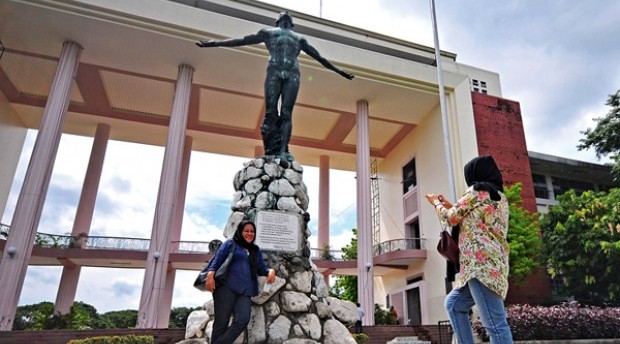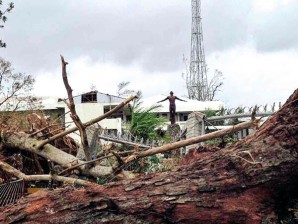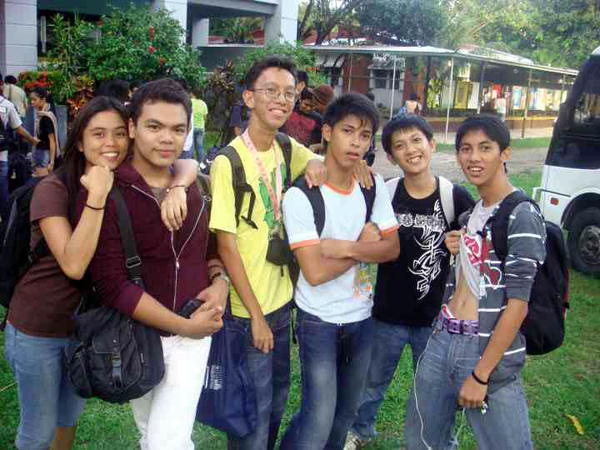UP Tacloban students in Diliman

OBLATION on the flagship campus of the University of the Philippines in Diliman, Quezon City. INQUIRER PHOTO
Just when he thought his diploma was within reach, University of the Philippines Visayas Tacloban (UP Tacloban) student Jed Morantte, a fourth-year social science major, went back to school feeling like “a college freshman again.”
Morantte is one of hundreds of students from the state university’s Visayas campuses who were allowed to enroll in other UP units for the second semester after Super Typhoon “Yolanda” wreaked havoc on Eastern Visayas in November last year.
Yolanda (international name: Haiyan) left UP Visayas’ Tacloban and Palo campuses badly damaged, submerging entire floors and destroying school equipment.

UP TACLOBAN in the aftermath of Supertyphoon “Yolanda,” which struck central Visayas on Nov. 8, 2013. MICAELA PAPA/GMA NEWS
In the case of UP Diliman in Quezon City, the administration accepted 261 cross-registrants from UP Tacloban. (See Table.)
‘Culture shock’
Morantte, who hails from Tanauan, Leyte province, said his first few weeks on the UP flagship campus was almost like a culture shock.
“It’s like becoming a freshman again,” he said, adding that after four years of being with the same people on a small campus like UP Tacloban, which has a student population of about 1,500, it was a little disconcerting to be in a classroom full of strangers.
Intimidating
“It’s a different group of people,” Morantte said. His first impression of the Diliman students was that they were intimidating. “People here [in UP Diliman] are smart. Some are rich,” he said of the Diliman students’ reputation.
Even communicating with and relating to them proved to be challenging at first. “I was very self-conscious; I was thinking of [ways] on how I could adapt [to the Diliman culture],” he said. “You have to learn to make friends, to approach them.”
“When speaking in Tagalog, I stumbled over my words because I wasn’t used to it,” he said, explaining that back in Tacloban, he was more confident in reciting in class and wasn’t afraid to make mistakes.
“But when I came here, there’s a feeling like you’re a freshman all over again. You feel very conscious when you speak … you think first before you speak because you might make a mistake or someone might judge you,” he said.
Adjusting well
However, the social science major said that after three months of attending classes in Diliman, he overcame these difficulties.
“I’m OK now,” Morantte said, adding that he has changed his perception of the Diliman students when he got to know them. “They’re very friendly,” he said. “By now, I learned to [get along] with them.”

JED MORANTTE, second from left, with friends in UP Tacloban before Supertyphoon “Yolanda.” CONTRIBUTED PHOTO
He has made friends with some of them. “I go out with them sometimes. We hang out on campus or on Maginhawa [street cafés and diners in Teachers Village, Quezon City].”
Morantte, president of a lesbian, gay, bisexual, transgender (LGBT) student organization in UP Tacloban, also found the liberal culture in Diliman refreshing.
“Sometimes, I come across LGBT couples holding hands, which I don’t see in UP Tacloban …. They’re so open,” he said.
Morantte, however, said he still couldn’t help but miss his home campus.
“I miss our organization’s tambayan (hangout). I miss my org mates,” Morantte said. “I also miss attending school events … I miss my profs whom I could talk to and whom I have become close to.”
“When I was still in UP Tacloban, I had a weekend habit. My friends and I used to go to this coffee shop by the bay. I miss that,” he said.
Morantte said he even missed the eateries and canteens around UP Tacloban, and the pancit burger, a Tacloban campus delicacy. “If you’re from UP Tacloban, you know the pancit burger. They put pancit between burger buns. It’s only P12. And it’s actually sufficient for lunch. The food in Tacloban is cheaper.”
Disparity in size
The Diliman campus, too, was different, he said, comparing the whole of UP Tacloban to a fraction of the Academic Oval— from the College of Engineering to the School of Economics.
And because of the disparity in size, those from Diliman have a different concept of distance. Morantte said that what was nearby or within walking distance for Diliman students was actually quite far for a typical Tacloban student.
In fact, almost everything in Diliman is bigger. To move from one end of the campus to the other requires an P8 jeepney ride. A P100 daily allowance requires conscientious budgeting. Dormitories within campus cost at least P3,000 a month, excluding electricity, water and food stubs for the in-house canteens.
For Morantte, the difference in routine is evident. “In Tacloban, it is only a single ride from house to the school. From the jeepney stop, I only have a short walk to the campus,” he said.
Aid, community’s support
But even if thoughts of his home campus were never far from his mind, Morantte said his move to UP Diliman was relatively smooth, thanks to the school administration’s assistance and the community’s support.
He said he was grateful that “the people here are very accommodating. All our immediate needs have been answered by the UP community.”
One of the most crucial forms of aid was the waiving of tuition of cross-registrants and of UP Diliman students who hail from Eastern Visayas.
Pascual memo
To accommodate the students from the damaged Visayas campuses for the second semester, UP president Alfredo Pascual released a memorandum last Nov. 13 requesting all campuses to open their doors to affected students and waive any requirements for cross registration.
After Yolanda, Morantte thought of getting a job instead of completing his college education. In fact, it was his sister, a first-year biology student, whom Morantte was thinking of when he inquired about the Diliman campus’ policy on cross registration.
“When they told me that a memorandum was released that allowed UP Tacloban students to cross register, I immediately arranged for my sister’s [enrollment],” he said. Morantte’s father, a retired government employee of the Department of Energy, then told him to do the same and continue with his schooling.
The affected students were transferred to the lowest category under the UP socialized tuition scheme, wherein tuition is dependent on a student’s financial status. If a student had already paid, the administration would reimburse the tuition.
Mark Diocton and Jim Data, computer science majors in their fourth and third year, respectively, are also cross-registrants, benefiting from the subsidized tuition.
Subsidy main reason
For the two students, the subsidy was the main reason they chose to enroll in UP Diliman for the second semester.
“Tuition was already a big help,” said Diocton, who is also the representative of UP Tacloban’s division of natural sciences and mathematics on the student council.
“[In Diliman], tuition is … [higher] than in Tacloban. The normal [fee] in Tacloban is P15,000 on average,” he added.
For Diliman students without scholarships and subsidies, a semester for a computer science major costs at least P25,000.
Other assistance
Aside from the subsidized tuition, other programs and services already available in UP Diliman were also offered to the affected UP Tacloban students, according to the Office of the Vice Chancellor for Student Affairs in Diliman.
These include free dormitory accommodation, access to scholarships, financial assistance, and guidance and counseling, all of which will be offered until the end of the semester.
“After the storm, a lot of people texted [us] and [students] on social media posted that these (programs and services) were the incentives,” said Data. “We compared the incentives being given by the different campuses and we preferred Diliman because dorms were free and they gave us a lot of other assistance.”
Diocton said: “Actually, we didn’t expect to receive these incentives. When we came here, we just wanted to continue our studies. All we knew was the tuition was free … We didn’t know we would receive further assistance.”
Free meals
“Further assistance” included free meals provided by UP Diliman and donations from various private organizations and the alumni, according to Diliman vice chancellor for student affairs, Ma. Corazon Jimenez-Tan.
Every school day, Morantte, Diocton and Data, along with others from UP Tacloban and Diliman students who hail from Eastern Visayas, would eat together at the Christ of the Risen Lord church for lunch and at the Kalayaan dormitory for dinner.
Most of the students also received allowances and other monetary aid from various benefactors.
“[The UP administration and alumni] gave financial assistance to almost everyone,” Diocton said. “From shampoo to socks, they (donors) are giving them to us, because they know that some of us brought nothing and have no allowance,” he added.
Morantte said that even until now, they were still receiving various forms of aid.
“They’re still giving us relief items like canned goods and toiletries … and [it’s the same] for the financial help and free food. Nothing has changed,” he said.
Triathlon team
Morantte has received cash assistance from a triathlon team (whose members include UP alumni), which also adopted two other students under the “Adopt a Student” program of the UP Alumni Association. His sister, in turn, gets a weekly allowance from a group of parents who have children studying in Diliman.
“[Even] those who don’t have any financial assistance, the administration is really looking for ways to help them. And as far as I know, there’s only a few who still need it,” he added.
The help did not stop at the administration level. For Data, his Diliman professors made it easy for computer science cross-registrants to catch up with the lessons.
“The advisers and teachers give recap on the lessons. They also give exemptions in some of the class activities,” Data said on his current computer sciences classes.
“And in almost all our subjects, you’re with someone from UP Tacloban. So it’s OK. The catching up is easy enough.” he added.
Diocton also said: “The teachers also know that we’re from Tacloban. So they ask us how we’re doing, how our studies are going.”
One-stop free shop
The Diliman community also created unique ways to help out. One such initiative was the “one-stop free shop,” a mini-convenience store where items like clothes, footwear, hygiene kits, snacks and bottled water are free.
Rommel Rodriguez, coordinator of Diliman’s Office of Student Activities that organized the store, said that in situations where the needs of students required immediate attention, “the response should be quick but, at the same time, creative and innovative.”
Creative, sports therapy
They used whatever goods were at hand, he said, to set up the free store. Then donations also came from students, campus organizations, faculty and alumni.
Vice Chancellor Tan said her department had been working with the different Diliman colleges in organizing various programs to support the Yolanda-affected students. Some of these include creative therapy with the College of Arts and Letters and sports therapy under the College of Human Kinetics.
Tan said that even student organizations, fraternities and sororities were more than generous in doing their part to help these students, especially during the holiday break.
One fraternity took charge of the students’ Christmas Eve dinner while a faculty member sponsored the New Year’s Eve meal, she said. “What’s great about this is it’s the whole community helping out, even the alumni,” she added.
Moral support
But more than these tangible forms of aid, what helped ease the move of the Tacloban students was the moral support from the Diliman community.
One student organization in particular, UP Sidlangan, composed of students from Eastern Visayas, also helped with the cross-registrants’ transition to Diliman campus life.
“Since we’re an organization of students from the Visayas, we have a lot of friends from UP Tacloban,” said Julian Alvarez, Sidlangan president. “So those we knew, we texted and said, ‘Let’s meet up and help each other.’”
Today, Sidlangan continues to help UP Tacloban students, whom Alvarez calls “our friends,” even if it’s simply by giving directions to Tacloban students lost on campus.
And for Diocton, it was this camaraderie with fellow students from Eastern Visayas, more often than not just a text away, that made it easy to start the semester fresh in Diliman.
“We from Tacloban are like a community. We’re only 1,500 students. So of those who cross registered [in Diliman] … we know almost everyone. Or if you don’t, they’re familiar to you,” he said.
This close-knit circle helped Tacloban students feel comfortable in their new environment, Data said.
“It is also fortunate that I have friends here in Diliman who are also from Leyte and they were the ones who helped me register in subjects and complete the enrollment process,” he added.
Determined
And though there are many issues and uncertainties that are never far from their minds, the students still strive to remain positive and are determined to graduate.
Diocton said he was aware that the financial assistance and other kinds of aid they have received could disappear.
But “it all depends on you,” he said, “if you really want to continue [your schooling], you’ll find a way to support yourself.”
This can-do attitude is also espoused by Data, who said he was very grateful for all the assistance he had received so far.
“You just need help to recover from this. Once you’re back on your feet, you can find your own way,” he said.
Morantte returned to UP Tacloban on Feb. 10 to take the remaining units he needed to graduate in April. These were subjects he was not able to enroll in when he was a cross-registrant.
Number of cross-registrants from UP Tacloban in other UP schools (As of December 2013)
Diliman, Quezon City 261
Cebu City 196
Iloilo City 52
Miagao, Iloilo province 7
Los Baños, Laguna 2
Total 518*
*This represents 34 percent of UP Tacloban’s student population before Supertyphoon ‘‘Yolanda’’ struck.
Sources: upv.edu.ph,UP Diliman Ofice of the Vice Chancellor for Student Affairs




















